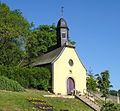Rodemack
| Rodemack | ||
|---|---|---|

|
|
|
| region | Grand Est | |
| Department | Moselle | |
| Arrondissement | Thionville | |
| Canton | Yutz | |
| Community association | Cattenom et Environs | |
| Coordinates | 49 ° 28 ' N , 6 ° 14' E | |
| height | 154-242 m | |
| surface | 9.96 km 2 | |
| Residents | 1,240 (January 1, 2017) | |
| Population density | 124 inhabitants / km 2 | |
| Post Code | 57570 | |
| INSEE code | 57588 | |
| Website | www.mairie-rodemack.fr | |
 Church with market place |
||
Rodemack ( German Rodemachern , Lorraine Ruedemaacher ) is a French commune with 1240 inhabitants (as of January 1, 2017) in the Moselle department in the Grand Est region (until 2015 Lorraine ). It belongs to the Cattenom et Environs community association.
Since its medieval substance has largely been preserved, Rodemack is also called the little Lorraine Carcassonne (French: La Petite Carcassonne Lorraine ). Rodemack is part of the association of the most beautiful villages in France (French: Les plus beaux villages de France ).
location
Rodemack is located in the border triangle France - Luxembourg - Germany , about six kilometers from the Luxembourg and almost 10 kilometers from the German border.
geography
The districts of Esing, Faulbach and Seming (1793: Simming) belong to Rodemack.
history
In the 9th century, Ludwig the Pious gave the area to the Fulda monastery . Since the distance between Fulda and Rodemack is considerable, Abbot Huoggi exchanged the area for other territories with Abbot Reginas von Echternach .
In 1190 Arnoux I occupied the area and built a first castle on the site of today's castle. The new lords of Rodemachern / Rodemack expanded their rule to the borders of Metz .
In 1492 all goods of the Lords of Rodemachern passed to the Margrave Christoph I of Baden . His grandson Christoph II founded the Baden-Rodemachern sideline . In 1542 a French army captured the fortress. However, by the Treaty of Crépy , Rodemack fell to Spain in 1544 . In 1552 the place was again French territory, to become Spanish again by the Treaty of Cambresis in 1559 .
This changeful fate continued through the 30 Years War , after which the Spanish crown again had the say in Rodemack. There were further changes of ownership between France and Spain until France gained the upper hand in 1678. However, the French claim was not confirmed until 1769 in the Treaty of Versailles. In the 18th century a conflagration devastated many of Rodemack's houses.
In 1792 Rodemack was taken by the troops of the Duke of Braunschweig . The defenders were allowed to leave the place on the intervention of Marshal Luckner . Rodemack experienced the last military siege in 1815 by the Prussians , who, however, had to withdraw after considerable losses.
In 1821 the fortress was razed by Rodemack .
Population development
| year | 1962 | 1968 | 1975 | 1982 | 1990 | 1999 | 2007 | 2015 |
| Residents | 534 | 506 | 488 | 650 | 771 | 804 | 1,065 | 1,167 |
literature
- Jean-Pierre Obry: Rodemack et ses seigneurs jusqu'en 1659. Metz 1948
- Sylvain Chimello: Rodemack. Serge Domini Editeur, Thionville 1998
- Fridolin Weber-Krebs: The Margraves of Baden in the Duchy of Luxembourg (1487–1797) . Porta Alba Verlag, Trier 2007
Web links
- Rodemacheren in the Topographia Circuli Burgundici ( Mathäus Merian )
- Website of the Syndicat d'Initiative von Rodemack (French, German)
- Rodemack Fortress (German)
- City wall Rodemack (German)










